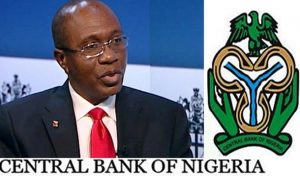Stakeholders await CBN directives on sale of Commercial Paper

Godwin Emefiele, Governor, Central Bank of Nigeria
Two weeks after the Central Bank of Nigeria (CBN), announced its readiness to buy Commercial Paper (CP), from large companies in order to lend to them at single-digit interest rate, some of the firms are still awaiting its directives.
According to the Director General designate of the Nigeria Employers’ Consultative Association (NECA), Mr Timothy Olawale, the employers’ apex body was yet to have a glimpse of the policy document.
READ ALSO: NECA advises FG, compel banks to stop stamp duty deductions
NECA is an umbrella body of employers in the country. It provides a platform for private sector employers to interact with the government, labour, communities and other relevant institutions in and outside the country, for the purpose of promoting a harmonious business environment.
In a telephone chat with Daily Sun at the weekend, Mr. Olawale said: “I actually heard about it in passing. I need to see the policy document, study it and respond”.
Speaking in similar vein, Mr. Taiwo Adeniyi, the 1st Vice-President of NECA, said he has not given thought to the issue. However, he opined that the apex bank knows the companies that can issue commercial paper. His words he said: “When they are taking such decisions, they have certain companies they are working with. So they know what they are doing. When they are taking such decisions they know which organizations can issue commercial paper. They know the people they want to use it to help. Even the Yuan they are talking about; has it started? Is it operational? The news has gone all over the World that we are doing currency swap. Who and who are benefiting from it? They should tell us. Even the commercial banks that know how to operate it, you will hear them say they are still waiting for CBN.”
READ ALSO: NECA’s Global Certification Limited (NGCL) gets accredited
Mr. Ayodeji Ebo, the Managing Director of Afrinvest Securities Ltd, sees the CBN’s move as a form of quantitative easing. He, however, advised the apex bank to come up with structures that will make SMEs participate in it.
His words: “This is a form of quantitative easing. The only reservation is that this will be mainly enjoyed by the blue-chip companies due to the SMES inability to issue Commercial Paper. The CBN may need to come up with structures that will enable the SMEs to take part in the quantitative easing as this segment is more critical to the growth of the economy.”
The CBN Governor, Mr. Godwin Emefiele, said at the end of the last Monetary Policy Committee (MPC) meeting, in Abuja, that the apex bank would buy commercial paper from large companies to lend to them at single digit interest rate.
His words: “The MPC deliberated extensively on what can be done to encourage banks to lend to the private sector because of the numbers we looked at during the main meeting. The MPC was concerned that credit to the real sector was sliding and there was the need to incentivize the banks to lend to the private sector.
“At this meeting, we saw improvement which was gratifying, but we feel we must still do what we want to do. In order to achieve lowering interest rate especially to agriculture and manufacturing sectors, we will encourage large corporates to issue CP in the market. In order to complement the banks, we expect that the CP will come in single-digit of 9 percent or below 10 percent, and for a long tenor, as high as five years or seven years, with a two-year moratorium, and for specific purposes.
“If the CBN sees those kinds of notes in the market, we will complement the efforts of the banks through any mechanism to support that by lending to that corporate at that single-digit rate. It is not meant to be in competition with the banks, it is meant to complement their efforts. We want to see that our objective to see to it that we achieve a lower interest rate of a single digit can come through this means.
“If a bank lends such money for new projects or plant expansion and it is verifiable, not for refinancing, a project for seven years inclusive of two years moratorium at 9 percent. That bank providing those evidence and verified by the CBN, we will go into the bank’s Cash Reserve Ratio and we will release cash of the equivalent sum to that bank at zero cost. In which case, that bank will earn its spread of 9 percent of that money.
“We feel this is novel. It is something that we should give a chance. In the past, we had reduced CRR and released liquidity into the market, but the liquidity was not channelled into the high-impact, employment-generating sectors and productivity sectors of the economy.
“That is why we feel we should approach it through this means. We believe this will work. We will, from time to time, monitor the level of liquidity in the market and we feel that rather than the banks using their monies to buy Treasury Bills, they can put money into these sectors. And we will provide the liquidity to fund these transactions, as long as they meet these specified terms and conditions.”
What is commercial paper?
According to the apex bank, “a commercial paper (CP) is an unconditional promise by a person to pay to the order of another person a certain sum at a future date. Such an instrument may or may not carry the bank’s guarantee. Where the bank guarantees the CP to make it more marketable in the money market, the instrument acquires the force of a Banker’s Acceptance (BA) and the bank incurs a contingent liability. Where the CP is not secured or guaranteed by the bank (clean CP), it needs not be reported as a contingent liability.”
In its November 2009 Guidelines on the Issuance and Treatment of Bankers Acceptances and Commercial Paper, CBN stipulated the following conditions for issuing and investing in the instrument: “A CP qualifies as a financing vehicle under these guidelines if: the issuer has three-year audited financial statements, the most current not exceeding 18 months from the last financial year end; and the issuer has an approved credit line with a Nigerian bank acting as an issuing and payment agent (IPA), where the bank guarantees the issue. Investors in CP shall be made aware of the identity of the issuer; CP shall only be guaranteed and not accepted since the intermediating bank is only a secondary obligor.
When a bank invests in a CP by disbursing its own funds, the transaction shall be reported on balance sheet and treated as a loan. However, if the bank merely guarantees the instrument, it shall be shown off-balance sheet as a contingent liability. Resale of CPs by banks/discount houses shall be accompanied by adequate documentation which should be provided to examiners on request.
“The CP shall be issued for maturities of between 15 days and 270 days, including rollover, from the date of issue; every issue of a CP is therefore, a separate CP. The capitalisation of upfront interest and discount on maturing CP shall be issued at the primary market for a minimum value of N100 million and in multiples of N50 million, thereafter.”
News credit: TheSunnewsonline Newspaper




Recent Comments